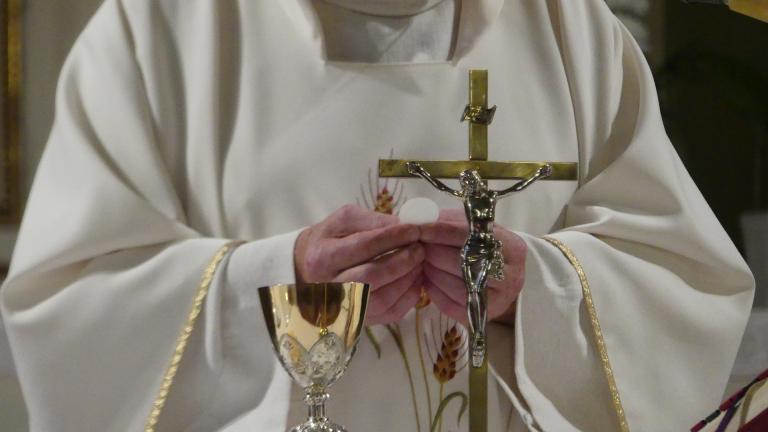Austin Ruse just published an article over at Crisis. And I like it. I don’t mean that I agree with every word that it says, but rather that I think everyone who dislikes Ruse, or abominates Crisis as a magazine, should read it.
Here’s why:
There’s a difficulty that I see frequently in left-leaning Christian circles, which is a tendency to subtly excommunicate those on the right – especially reactionaries who seem to struggle a lot with contemporary social change. It’s never quite out in the open, the way that it is in the right. You don’t see people writing articles about how Ted Cruz should be denied communion for his support of war-crimes. Nobody badgers their Bishops to formally excommunicate theologians who dissent against Laudato Si. The autos de fe are not lighted with the same formality in the public square, and this can provide the illusion that liberals are all for an inclusive church, a church where everyone is welcome, a church where the mercy of God is freely on offer even to those who deserve it least (and need it most.)
In practice, though, it’s a different story. Certain sins are not acceptable. The man who can’t walk into a church without immediately casting his eyes over all of the female congregants to make sure none of them are wearing yoga pants? That guy needs casting out. The apologist who evangelizes primarily to enlarge his own ego and constantly sticks his foot in his mouth? That guy is an embarrassment to the faith. The short-tempered priest who struggles with control issues and keeps driving half his congregation away? Defrock him. The obsessive pro-life woman who constantly posts pictures of dismembered babies on her FaceBook feed and looks down on other women if they have less than 5 kids? What is she even doing here?
These sinners must be cast out, or at the very least pushed into hiding, for the good of the congregation and the betterment of the Church.
I’m not going to claim to be innocent in this respect. I have made my share of sneering comments about Ruse and his ilk. On more than one occasion I have been tempted to leave the Church – precisely because this kind of person is allowed in. I’ve longed to see my enemies shut down and rebuked by their bishops. I have, in opposing the Culture War, come too often to despise the Culture Warrior, as though his whole identity could be reduced to his cause.
Meta-Pharisaism, it’s called. The condition of thanking God that one is not a Pharisee like those Christians over there.
Which is why I loved Ruse’s article: because it humanizes the temptations that confront someone whose politics make me want to rip my hair out, and it shows God’s grace working on a heart that is different from my own.
We say that the Church is supposed to be a hospital for the sick, and not a country club for Saints. But here’s the thing about a hospital. It’s not only going to contain only the kind of patients who are ready-made poster-children for the fundraising drive: the little girl with leukemia clutching her teddy bear, the grateful woman receiving a blood transfusion after a traumatic birth, the kindly old man saying his last goodbyes to his grand-daughter. A hospital also has to provide for the incoherent homeless man who soiled himself an hour ago, and who is now wandering drunkenly around the emergency waiting room muttering inappropriate comments about the other patients to himself.
This applies just as much to the kind of people that left-wingers find odious as it does to the kind of people who are reviled by the right. God’s mercy does not make distinctions. In God’s eyes, every human person is a unique expression of the goodness, the beauty and the truth which spring from His own being. That image is, in every case, marred by sin, and in every case it stands in need of redemption. The Church is the most perfect vehicle of that redemption: within Her Sacraments the practices of love, mercy, healing, renewal, fruitfulness, care, and communion are distilled and offered to anyone who seeks them. Which means that the Church must be able to include us all.
But let’s be real. Most of us arrive at the doors of the Church thinking that some of our gravest sins are not sins at all. That they are virtues even. It is only in relation to Christ, a relationship that is mediated through His Church, that we really come to understand who we are, and how we need to change if we’re going to get better. Sometimes the grace to change comes through the formal teaching of the Magisterium. Sometimes it comes through those who support and encourage us in our faith formation. And sometimes, though nobody likes to admit this, it comes through those Christians that cause our blood to boil.
The Christians who scandalize us are, ironically, an essential part of life in Christ. They remind us that the Church is not, and never can be, a clique. It can never be a community of the like-minded. It can never serve solely as a vehicle for my own values, needs, agendas or beliefs. It can never be a place where I belong — insofar as my belonging excludes anyone else’s hang-ups, sins or irritating quirks. Christ came not to bring peace, but a sword. The conflicts within the Church are necessary because through these conflicts that we come to understand that loving as Christ loved means loving people who would gleefully nail you to a board.
At the end of the day, what matters is not that we were on the right side of the bitter internecine struggle which makes up the life of the Church, but rather that we were willing to love our enemies, to sit with them at table, and embrace them as brothers and sisters in Christ.













